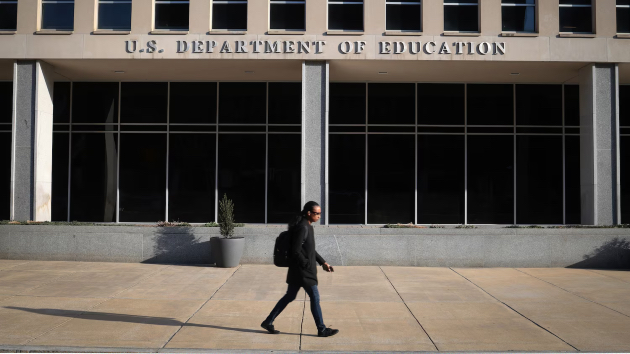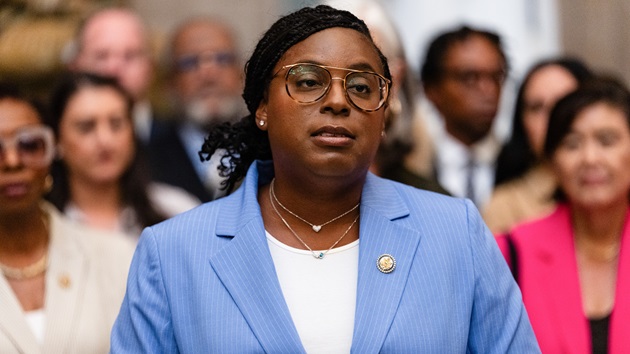DeSantis says his economic plan hits ‘woke’ capitalism, China, immigration
Written by ABC Audio ALL RIGHTS RESERVED on July 31, 2023

(ROCHESTER, N.H.) — As his presidential campaign embarks on a strategic reset, Florida Gov. Ron DeSantis on Monday unveiled a broad economic agenda aimed at, among other things, severing the United States’ business ties with China, ending “reckless” federal spending and fighting “woke” policies that he argues have infiltrated America’s financial systems.
The Republican presidential hopeful took a brief reprieve from a schedule loaded with small-venue events to roll out a 10-point plan that he dubbed the “Declaration of Economic Independence.”
“Our country is in decline right now,” DeSantis told an audience at a Rochester warehouse.
His new economic policies echo and expand on various key parts of his pitch to conservative voters so far, including promising to overhaul the country’s tax code, to make it simpler and more competitive; promising to roll back the “bureaucratic state” and “unleash our domestic energy sector, modernize and protect our grid, and advance American energy independence”; and promising to curb the use of diversity, equity and inclusion programs in the corporate sector, which DeSantis’ platform labels as “discrimination.”
His new plan vows to ensure 3% economic growth — slightly higher than the current rate — and a “great industrial revival, with a goal to become #1 in the world for skilled trades by 2030.”
At his event on Monday, he said, “I’m running for president because we need to reverse the decline in this country and restore our country to the greatness that it deserves, and that begins with restoring an American economy that actually works for American families again.”
DeSantis placed much of the blame for not achieving that on what his campaign called the country’s “abusive relationship with” China’s ruling Communist Party.
In the news release, he vowed to “demand that American companies act in accordance with American interests – which means preventing companies from sharing critical technologies with China and banning the sale of strategic assets like farmland to [Communist Party] members and their affiliates.”
Some politicians, led by Republicans, have expressed alarm at Chinese companies buying farmland in the U.S., though the overall rate of Chinese ownership remains very small and restricted in some states, according to the federal government.
On Monday, DeSantis also ripped the current pace of federal spending, pledging in the release to be “a new sheriff in town when it comes to spending” who would “not be afraid of using his veto pen.”
Aligning with a central tenet of his campaign for president, he also said that he would fight so-called “woke corporations” who he argues use diversity initiatives “to impose heavy-handed, left-wing edicts.”
In a point that evoked the enormous bank bailout after the 2008 financial crisis, DeSantis said in the release that in the event of another crisis, he would deny “those accountable of all golden parachutes and prevent the further accumulation of wealth to those already deemed too big to fail.”
Many details of the plan feature common points he discusses in front of voters on the campaign trail.
He regularly calls for expanding domestic energy production, reversing mandates to purchase battery-powered vehicles and ridding universities and colleges of “useless degrees.” (“Zombie studies” is the preferred example he mockingly uses.)
The plan singles out the Federal Reserve, with DeSantis saying he’d appoint a chairman “who will focus on maintaining a stable dollar” and “stable prices.”
And DeSantis’ plan ties his restrictive immigration policies to the economy, contending that a “fair labor market” is possible through “securing the border, enforcing our laws” and other changes, such as “limiting unskilled immigration.”
The plan promises some student loan reform and would push to “allow student loans to be discharged through bankruptcy like any other loan” while making “universities, not taxpayers, responsible for the loans their students accrue.”
Notably, DeSantis’ new economic plan does not include a specific pledge to end the IRS, which he has on multiple occasions indicated he would do, though in response to a question at Monday’s event, the governor said he “would be game for that.”
“You send me that, we’ll sign,” he said before moving on to another part of the question.
In Gardnerville, Nevada, last month, he pitched a plan “to get rid of the IRS and send it off into the sunset.”
Monday’s speech interrupted a recent flurry of intimate campaign stops — from a church in Albia, Iowa, to a diner in Derry, New Hampshire — intended to increase the governor’s presence in the early voting states as his campaign undergoes a reboot amid stagnant early poll numbers that show him trailing front-runner Donald Trump even as he remains the most popular candidate among the rest of the field.
DeSantis’s economic policy rollout came hours after New Hampshire Gov. Chris Sununu — who has not endorsed in the presidential race but has met with DeSantis during the campaign — told radio host Hugh Hewitt that he advised the Florida governor, “Don’t worry about the policy stuff.”
“We’ve got that,” Sununu said. “You’ve got to be about character, about looking people in the eye.”
Copyright © 2023, ABC Audio. All rights reserved.
 KVSP
KVSP 




